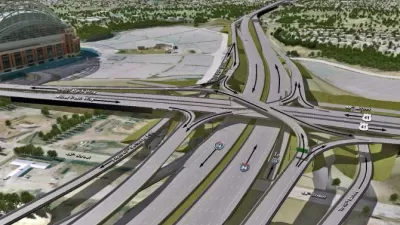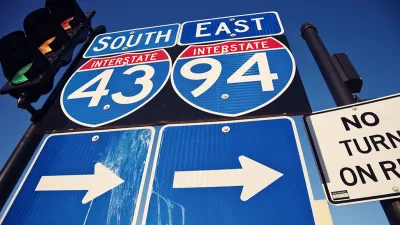Some people call it a road-building program. Others call it "an all out war on urbanism."
Michael Grunwald has produced a large, magazine-style feature for Politico's "The Agenda" series. The feature examines the city of Milwaukee's "addiction to megahighways" as an examples of a proclivity found all over the country.
Grunwald begins by describing the Marquette Interchange, completed in 2008, as the "largest and most complex road project in Wisconsin's history."
"Seven years later, though, the Marquette is no longer an outlier. The state is already building or planning three larger freeway projects in the Milwaukee area alone; the expansion and reconstruction of the nearby Zoo Interchange will cost more than twice as much as the Marquette. It’s all part of a $7 billion effort to widen and modernize the interstates around the city, an effort so massive it has its own line item in the state budget, 'Southeast Wisconsin Freeway Megaprojects.'"
The state's desire to build so many highways, at such extravagant cost, has informed some of Governor (also presidential candidate) Scott Walker's most heated political controversies, including his own party rejecting his road-building program, thus leaving the state budget in limbo, and a federal court ruling that the Wisconsin DOT used faulty projections to justify a highway widening project.
The article relates the example of Milwaukee and Wisconsin to a larger debate—fueled by the ongoing struggles of Congress to produce a long-term transportation-funding bill—about how much should be allocated for maintenance of existing infrastructure versus new construction.
Grunwald also calls on John Norquist, former mayor of Milwaukee and former president of the Congress for New urbanism, who is quoted in the article speaking bluntly about the effects of the Wisconsin road-building program. "It’s an all-out war on urbanism," says Norquist.
FULL STORY: Overpasses: A love story

Alabama: Trump Terminates Settlements for Black Communities Harmed By Raw Sewage
Trump deemed the landmark civil rights agreement “illegal DEI and environmental justice policy.”

Planetizen Federal Action Tracker
A weekly monitor of how Trump’s orders and actions are impacting planners and planning in America.

Why Should We Subsidize Public Transportation?
Many public transit agencies face financial stress due to rising costs, declining fare revenue, and declining subsidies. Transit advocates must provide a strong business case for increasing public transit funding.

Judge Orders Release of Frozen IRA, IIJA Funding
The decision is a victory for environmental groups who charged that freezing funds for critical infrastructure and disaster response programs caused “real and irreparable harm” to communities.

‘Clybourne Park’ Sets Stage for Housing Equity Discussions
Clybourne Park, a play exploring race, real estate, and community tensions, can set the stage for discussion on the lasting impacts of housing discrimination, gentrification, and the fight for affordability.

Understanding Road Diets
An explainer from Momentum highlights the advantages of reducing vehicle lanes in favor of more bike, transit, and pedestrian infrastructure.
Urban Design for Planners 1: Software Tools
This six-course series explores essential urban design concepts using open source software and equips planners with the tools they need to participate fully in the urban design process.
Planning for Universal Design
Learn the tools for implementing Universal Design in planning regulations.
Caltrans
Smith Gee Studio
Institute for Housing and Urban Development Studies (IHS)
City of Grandview
Harvard GSD Executive Education
Toledo-Lucas County Plan Commissions
Salt Lake City
NYU Wagner Graduate School of Public Service





























